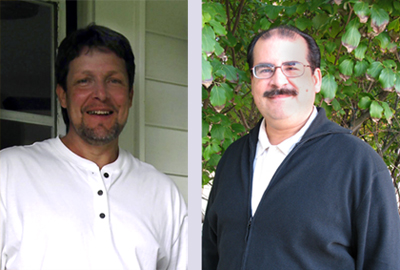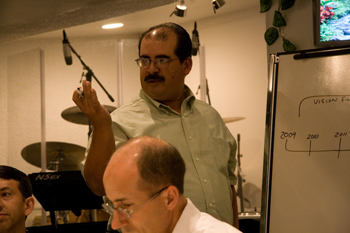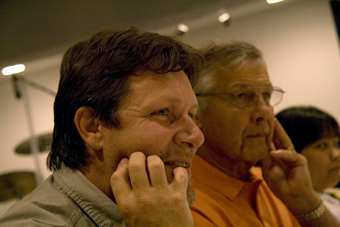Forrest Moyer, Blooming Glen
moyerf@mhep.org
 Redemptive renewal…a fully-engaged peoplehood…drawing on the best of the Anabaptist tradition…God’s unfolding reign in our midst…opening up to the world…coming together…appreciating differences…a passionate call and gifting…offering ourselves like Jesus did…
Redemptive renewal…a fully-engaged peoplehood…drawing on the best of the Anabaptist tradition…God’s unfolding reign in our midst…opening up to the world…coming together…appreciating differences…a passionate call and gifting…offering ourselves like Jesus did…
These are words used by Franconia Mennonite Conference leaders, Noel Santiago and Blaine Detwiler, to describe a vision for the conference. The two men have recently been appointed to conference leadership roles, and they are united in a desire to see this community follow in the way of Jesus.
Noel Santiago is now serving as Franconia Conference’s Executive Minister. He is responsible for overall leadership of conference staff and operations, oversight of conference ministry, and coordination of missional partnerships with ministries beyond the conference structure. Noel came to Franconia Conference ten years ago to serve as part of a Mission Leadership Team that worked to help the conference develop a missional orientation in its focus and activity.
Born in Puerto Rico and raised in Lancaster County, PA, Noel describes himself as a “Puerto Rican – Dutchman.” Eating shoofly pie in Pennsylvania Dutch country and visiting relatives in Puerto Rico, he grew up “in between” two vibrant cultures, an experience that prepared him at an early age for reaching beyond borders of culture and language. After college, Noel spent time working in Costa Rica through Mennonite Board of Missions and gave leadership to study-and service semesters in Central America for college students from the United States and Canada. From He came to Franconia Mennonite Conference in 1996. Noel says that during his time of work with the conference, he has been blessed to see its community opening itself up to the world and especially the global south and east. Noel and his wife Juanita and their four children are part of the Blooming Glen congregation and live in Souderton, PA.
Blaine Detwiler’s story is different, but also about reaching beyond borders. Blaine was born in Franconia Township, PA, near to Franconia Mennonite Church, where his family attended. In the late 1950s, his parents sold their farm and moved to Susquehanna County, PA, as part of a small migration of farming families from this community who moved to that region and formed Lakeview Mennonite Church. Blaine spent his growing up years far from the geographic center of Franconia Conference and understands what it means to have a peripheral relationship with the conference community. After studying at Delaware Valley College in Doylestown, PA, he returned to his home community and worked as a dairy farmer for 18 years, until he sensed a call to study at seminary. In 1992, he sold his interest in the farm and went to school at Eastern Mennonite Seminary. Upon graduation, he was called back to ministry at his home congregation of Lakeview and has served there as pastor for over a decade. He and his wife Connie have two grown children and three grandchildren.
Blaine began a term of service as Assistant Moderator of Franconia Conference in 2006. He serves on the Conference Board, the Faith and Life Advisory Council, the Vision and Financial Plan Team, and as a representative of Franconia Conference to the Mennonite Church USA Constituency Leaders Council. He sees in Franconia Conference great potential for sharing Christ’s love with the world, and he hopes to work for positive growth, as one would work to cultivate a crop or a tree—pruning a bit here, digging around the roots there, “doing what is needful to spur growth.”
Both Blaine and Noel hear the call of God to expand the Kingdom, to include more, to reach beyond what we know and are comfortable with. And with most of the Franconia Conference community situated in a diverse urban/suburban environment, close to urban centers like New York, Washington and Philadelphia and millions of people from all parts of the globe, and with Franconia Conference people living and traveling around the globe on a daily basis, the call to expand our vision becomes all the more compelling.
Franconia Mennonite Conference has a long and rich heritage of Christian faith and witness, but historically the conference has been a closed community that allowed for little diversity in culture, language, and ethnicity. Even in the 20th century, our congregations often remained oriented to a plain Pennsylvania German lifestyle and revolved around extended family relationships. This was a strong culture sometimes difficult for new disciples from varied backgrounds to find a home within and real acceptance.
 Nevertheless, Noel has been impressed with the longevity and resilience of the Franconia Conference community. “With its many up and down times, the people of Franconia have adjusted, readjusted, and refocused their efforts on that which they believed God was calling them to. I have seen and experienced this response…I have experienced Franconia opening herself up to the world…in ways that demonstrate the goodness of God in those who came before us.”
Nevertheless, Noel has been impressed with the longevity and resilience of the Franconia Conference community. “With its many up and down times, the people of Franconia have adjusted, readjusted, and refocused their efforts on that which they believed God was calling them to. I have seen and experienced this response…I have experienced Franconia opening herself up to the world…in ways that demonstrate the goodness of God in those who came before us.”
Blaine also celebrates the past and the way that Franconia Conference has maintained an Anabaptist witness over the years. He hopes that we can draw from our history the good of Anabaptist faith—for instance, emphasis on practical living of faith and an understanding that we are “Christians first and citizens second”—and leave behind any tendency to work for the status quo or maintain privileged positions.
Blaine speaks of the vision of Christ in Luke 13:29: “People will come from east and west and north and south, and will take their places at the feast in the kingdom of God.” This vision calls us to embrace various origins, cultures, and languages, even here in the Northeast Corridor. It calls us as a conference to expand our vision, to reach beyond our own culture and language and to give ourselves to our neighbors in the way that Christ gave himself to the world.
Noel shares his vision for the conference community in simple form: “That in all we do we end up seeing three things: 1) new believers and, from these, new leaders, 2) freed disciples of Jesus who are passionately living out their call and using their gifts in all arenas of life, and 3) transformed society that has been impacted by the collective engaged alignment of all of God’s people in this region being united in Jesus Christ!”
 Surely this is vision for a healthy, growing Christian body, equipped to share good news in a diverse environment. May Franconia Conference, with all her strengths and weaknesses, find a part in this expanding community of God’s Kingdom.
Surely this is vision for a healthy, growing Christian body, equipped to share good news in a diverse environment. May Franconia Conference, with all her strengths and weaknesses, find a part in this expanding community of God’s Kingdom.
Forrest Moyer is the Project Archivist for the Mennonite Heritage Center. He is a graduate of Kutztown University and grew up attending Finland Mennonite Church.
The opinions expressed in articles posted on Mosaic’s website are those of the author and may not reflect the official policy of Mosaic Conference. Mosaic is a large conference, crossing ethnicities, geographies, generations, theologies, and politics. Each person can only speak for themselves; no one can represent “the conference.” May God give us the grace to hear what the Spirit is speaking to us through people with whom we disagree and the humility and courage to love one another even when those disagreements can’t be bridged.
